Most hospital bed mattresses are called medical or therapeutic mattresses, and they can help people feel better and protect them from bad effects when they can’t move for long periods.
Table of Contents
It might not be very comforting to purchase a hospital bed mattress. There are so many different types of hospital bed mattresses that it can be hard to figure out which is best for your loved one or patients.
Benefits of hospital bed mattresses
The following are the benefits of hospital bed mattresses:
- Enhances Recovery Time:
By offering more stability and ease, a decent hospital bed mattress helps shorten the recovery period. Patients recovering from surgery or an injury should be especially aware of this.

- Reduction of Pressure Points:
Additionally, a decent hospital bed mattress will spread your weight uniformly, avoiding the formation of pressure points. This is important since pressure points can hurt and raise the possibility of getting pressure ulcers.
- Lower Chance of Falls:
Falls are risky and can result in severe injuries, including fractured bones. Using a decent hospital bed mattress lowers the danger of falls, one of its many advantages. This is because a good hospital bed mattress adapts to the body’s shape and offers a more solid sleeping surface.
- Greater Durability:
Mattresses for hospital beds last a lot longer than those for regular beds, don’t require monthly flipping,
Hospitals can spend less money on mattress replacements because of their durability.
A hospital bed mattress is what?
Traditional mattresses might not be good for people with certain health problems, worsen them, or even cause pressure ulcers called “bedsores.”
Hospital bed mattresses are better for preventing and treating pressure sores.
Compared to conventional mattress producers, hospital bed mattress makers use different materials in their goods. The innerspring, foam, gel, and air in these materials are all the same as what you find in a regular mattress.
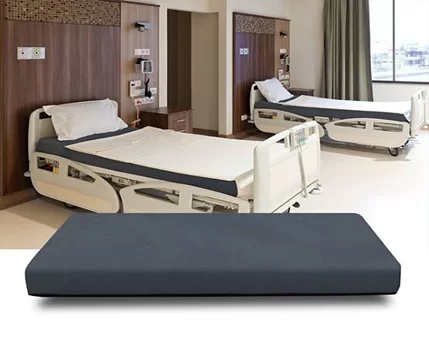
Mattresses for hospital beds should also be hygienic, antibacterial, and waterproof. The mattress complies with medical-grade sanitary standards thanks to these features.
Medical mattresses may often adjust head, leg, and bed heights. Additionally, they can flex when the head and legs are moved.
Kinds of hospital bed mattress
- Foam mattress
Research shows that foam mattresses have surprising qualities that can make the user feel cozy and comfortable and reduce the chance of back pain, which some people who spend a lot of time in bed sometimes get.
Even though they don’t let air flow as well as innerspring models, these mattresses are cheaper and lighter than those with springs. Pressure ulcers can be stopped by making models with different layers, zones, and densities.
- Pros:
- Back discomfort is reduced with comfortable support.
- Eliminates motion’s shock.
- Stops pressure sores from developing.
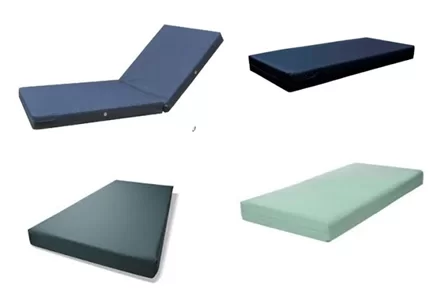
- Cons:
- For more serious pressure injuries, this is less useful.
- There is hardly much airflow.
- Alternating pressure mattress
Alternating pressure mattresses are best for people with bedsores, pressure ulcers, or a history of getting ulcers.
Alternating Pressure: The mattress will reduce pressure and control skin moisture by inflating and deflating its air cells.
In addition to providing pressure point relief for added relaxation, these mattresses encourage circulation and blood flow for healthy skin.
- Pros:
- Increases circulation.
- Aids in the recovery of bed sores and pressure ulcers.
- Provides additional pressure point comfort.
- Aids in controlling skin moisture to encourage the healing of pressure ulcers and generally healthy skin.
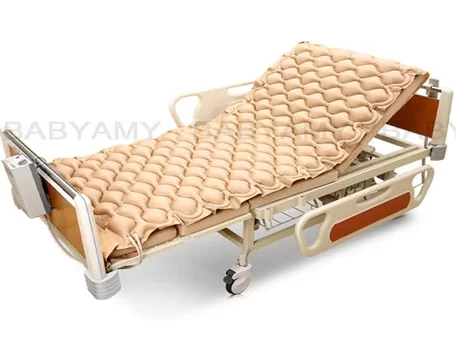
- Cons:
- Less-priced models offer less therapeutic assistance.
- Need a continuous motor and pump, which could be disruptive to sleep.
- Innerspring mattress
The most straightforward option available for hospital bed mattresses is the innerspring mattress. Innerspring mattresses with evenly spaced coils are better for people who don’t have to stay in bed all the time and don’t get out of bed often.
This design promotes good airflow, which keeps the user dry and cool, improves their sleep, and helps their skin stay healthy.
- Pros:
- Facilitating airflow to encourage a cool, dry sleeping surface.
- Attractive pricing range.
- They can pick a stiffness that is comfortable for them.
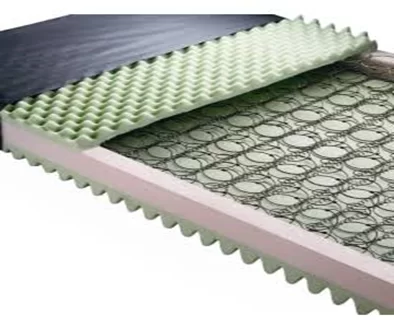
- Cons:
- Avoid treating skin conditions that may develop at pressure sites.
- It is not recommended for users who are confined to beds.
- Low air loss hospital mattress
Low-air loss mattresses are ideal for individuals prone to pressure wounds, such as those immobile or with inadequate sensory experience. They can treat and prevent pressure injuries in people who can’t move or adjust while lying in bed, like those with illnesses that slow blood flow.
- Pros:
- Reduces the growth of moisture and provides absorbing qualities to keep skin dry.
- Increases blood flow to pressure ulcer-prone areas, assisting the active healing of bedsores.
- The patient is submerged in the surface instead of being on the mattress.

- Cons:
- Use a pump and motor that are noisy and may interfere with sleep.
- Demands a continuous power supply.
Things to consider before buying a hospital bed mattress
- Regarding cleanliness:
For patients who are ill, a waterproof hospital mattress that is stain-resistant is extremely helpful.
A hospital bed with an antibacterial mattress keeps the sleeping area clean and allows the caregiver to wipe up any spills quickly. A clean bed is just as crucial as a pressure-relieving mattress for better sleep.
- Movement of the patient:
It is simple to purchase a hospital bed mattress with perimeter barriers to prevent patients from slipping out of bed. Using hospital bed guard rails is another option for preventing bed falls.
- Customer Size:
Selecting a mattress for a home or hospital bed slightly longer than the patient’s height is preferable. A bariatric mattress, which comes in foam and pressure-relieving varieties, is preferable for heavier individuals.
- The durability of the mattress:
Examine your beloved one’s health before choosing a suitable hospital bed mattress. Is it a chronic illness that would require prolonged use?
When purchasing a mattress, cost, and durability are important considerations. Always stick to your spending limit when purchasing online to save more money.
How Should I Clean My Hospital Mattress?
The correct cleaning of hospital bed mattresses is necessary. By regularly cleaning and disinfecting your mattress, you can extend its lifespan. Always remember that the strongest chemicals are used to clean your hospital mattress. Use sparingly because using powerful solutions could harm the fabric.
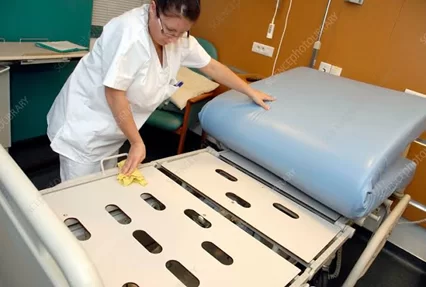
FAQs
Do hospital beds need special mattresses?
Yes, a particular mattress is required for a hospital bed. Regular mattresses are not intended to be used with adjustable bed frames. A mattress made for a hospital bed is more sanitary and can be easily cleaned and maintained.
What type of mattress is best for a hospital bed?
Hospital bed mattresses sold today are most frequently made of foam. Given all the advantages, it is likely that choosing this will be the best course of action for your patient. Patients needing relaxation and therapeutic support can get it from foam mattresses.
How durable are hospital bed mattresses?
7–10 years is the ideal lifespan for high-quality hospital mattresses.
Why are hospital beds so comfy?
To conform to the form and position of the person, premium hospital bed mattresses use memory foam or progressive laminated foam. They are designed to effectively distribute stress, minimizing the shear and stress that lead to bedsores. Consumer-grade mattresses are not intended for hospital beds at home.
Conclusion
Doctors advise hospital bed mattresses for patients who must spend a lot of time in bed or are in danger of developing bedsores. People with limited movement could not get enough support from conventional beds.
Foam, gel, innerspring, and air mattresses are all common choices for hospital beds. This is because they distribute a person’s weight evenly, which helps prevent and treat pressure ulcers.
Patients can also add a customized topper to their current mattress to prevent and treat pressure ulcers.


